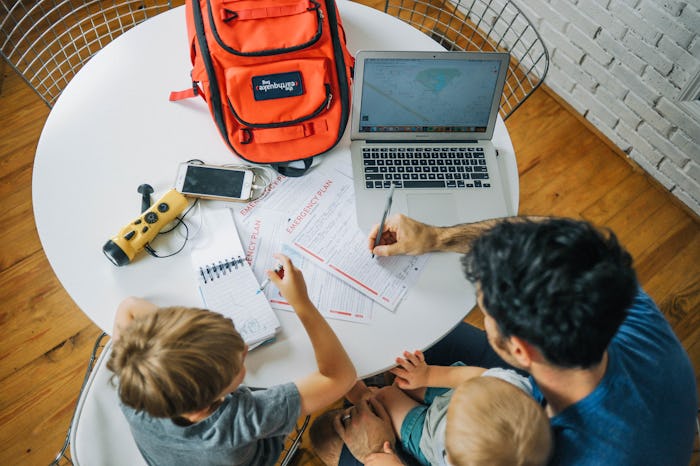As a native Texan, I have lived through more hurricanes and tropical storms than I care to tally up. I have watched tropical storm waters rise in my parent's front yard as a child, evacuated from a major hurricane as a brand new teenage driver, and as an adult with children of my own, stayed up night after night during Hurricane Harvey to see if my own home would flood while friends and neighbors were carried away in boats. Preparing as a family for disasters is something I have done my entire life, but I still struggle with the idea that some families wait until it is too late to begin prepping for an emergency situation.
With Hurricane Dorian currently ravaging the eastern U.S. coast and having caused an abundance of devastation already in The Bahamas, expert in disaster preparation, Redfora co-founder Skyler Hallgren, spoke with Romper to address how families can prepare for emergency situations ahead of time.
"Here's the deal — emergency supplies are about replacing the utilities and services we take for granted every day," Hallgren tells Romper. "When a disaster or emergency strikes, you can’t rely on electricity, running water, open grocery stores, or cell service, so it’s about having a backup plan."
Many people think about the aftermath of a disaster in terms of how life will be impacted once the event is passed. Will you still have a home, a job, a car? But having a plan in place for how your family will behave during a natural disaster is imperative. "The simple fact is that you can’t get prepared after an emergency happens. It’s easy to think that you can just wing it and figure it out in the moment, but emergency situations don’t work that way. Hopefully you never need to use your emergency supplies and plan. That being said, making a plan and gathering your supplies isn’t that difficult (and we exist to make it easy), but not having a plan when you need one can be devastating," Hallgren shares.
Redfora supplies families with ready-to-use disaster kits to keep on hand for events like earthquakes and hurricanes. While you can always purchase one of their pre-made kits to keep in your home and car for your family and pets, Hallgren says there are a variety of items you should keep at the ready at all times to prepare for a disaster. "In short, it’s vital to have supplies on hand to provide food, water, shelter, warmth, communication, light, first aid, hygiene, and personal protection. Stash food and water with a long shelf life (at least five years, 30 is ideal), and have a way to purify more water with a high-quality filter or purification tablets. A hand crank or solar-powered flashlight/radio/phone-charger is a must-have to stay lit and in touch. A thorough first aid kit and hygiene kit should be a top priority as well," he tells Romper. He also notes that having an easy-to-carry bag for all of your supplies is essential, and suggests a hiking pack or rolling bag for storage.
"Having the essential emergency supplies prepared is important, but so many people forget to make an emergency plan that is custom to them. In short, everyone should know the emergency plan for their work or school and share it with the family. It’s also important to have a plan to meet up and get in touch after an emergency, in the event you are separated. Lastly, do a home walkthrough together to identify hazards and think through ways to reduce the risks," Hallgren shares, including that Redfora has easy instructions on their website for creating such a plan. "Remember, everyone’s emergency plan is going to be different and unique to your family and where you live. Even with your supplies, you’ll need to add personal items like prescriptions, glasses, an extra jacket, and an old pair of sneakers. Consider adding cash, a paper map of your area, and a spare set of keys. Lastly, make copies of your important documents — passport/ID, insurance cards, and other important info are crucial during an emergency situation."
Hallgren also explains that keeping kids in the loop about disaster plans may seem daunting, but it is an absolutely vital piece of the preparedness puzzle. "Like any other sticky topic, kids respond best to straight talk with a positive attitude. Create an emergency plan together and practice what everyone will do in the event of an emergency. Explain that emergencies happen, and use it as an opportunity to problem solve together. What would we do if the electricity went out? Find out by having a 'lights out' night, and figure it out together," he says.
He also says that having emergency drills to practice your family's evacuation drills can become a regular part of your family routine to make it less scary for kids. "If your kids have questions about a disaster in the news, find a way to make a positive impact together. Find a place to volunteer and give back to folks that need help close to home, and instill a passion for helping out," Hallgren adds.
While hurricanes as detrimental as Dorian and Harvey may be a rarity, being prepared for emergency situations that may displace your family from your home or create an environment within your home that is less than ideal can save lives. "Don’t let fear hold you back from assessing your risks honestly and making a common sense plan as a family," Hallgren explains. "Use it as an opportunity to bond as a family and with the community around you. Once you have your plan in place, go on living your life! You’ll be able to rest easy knowing your family is ready for anything."
